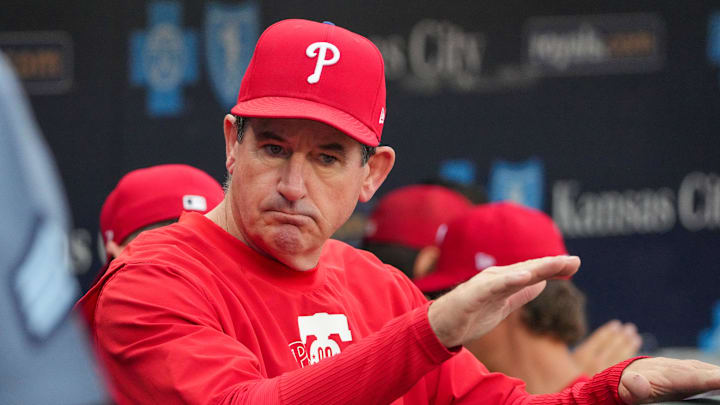Rob Thomson has now guided the Philadelphia Phillies to three postseason appearances since taking over the managerial reigns in June 2022. On the surface, it's a great success. Digging down and looking at how the Phillies scuffled into the MLB playoffs this season, it doesn't seem like such an accomplishment. Even with 95 wins and the NL East title, the shine has worn off after a disappointing finish to the 2024 season.
The goal was to return to the World Series and win it. Thomson failed to get them there. They're now a step further back from where they finished last season. Going from a World Series appearance in 2022 to a seven-game NLCS loss in 2023 to an NLDS loss in 2024 doesn't feel like forward progress.
Questions will inevitably be raised about Thomson's job security after the Phillies' Game 4 loss and the pedestrian way the team played for the better part of half the season. After a scorching first stretch, sitting at 45-19 on June 8, the Phillies flatlined and were a .500 team. They went 51-51 the rest of the way, including the 1-3 NLDS.
There's a reason that managers are the fall guys when teams underachieve. Does that mean the front office should let Thomson go as part of the offseason changes? There's certainly a portion of the fanbase that believes so. Although Thomson has backers.
Former Phillies GM Ruben Amaro Jr. weighs in on Rob Thomson's future after early playoff exit
Thomson has one year remaining after getting an extension through 2025 following the 2023 season. That doesn't mean he's safe. In the aftermath of the Phillies' elimination, former Phillies general manager Ruben Amaro Jr. voiced his support for the skipper on The Phillies Show podcast.
"I do believe in my heart of hearts that Rob Thomson is, or letting him go and people are talking about that, I'm sure, is not the answer because he is outstanding, and I believe in the guy," Amaro said when the topic of leadership changes came up. "That said, you may see some personnel changes ..."
At the end of the day, the manager of a ball team is ultimately responsible for the team's performance. Despite having a veteran-laden squad this season that, from all accounts, took care of itself in the clubhouse, it was Thomson's job to get the best out of them on the field. That didn't happen in this NLDS. It didn't happen for much of the second half of the season.
Of course, you can point up the ladder to the front office. President of baseball operations Dave Dombrowski and general manager Sam Fuld are ultimately responsible for the construction of this failed roster. You have to also point to the players who didn’t show up. The starting pitching got the job done in the playoffs. The offense and bullpen didn’t show up for Topper.
But there's a long offseason ahead and plenty of time to dissect the problems with assembled pieces.
"There's going to be an accounting somewhere for this. I don't know where it is. I would agree with you on Rob Thompson," Jim Salisbury added in agreement with Amaro. "I think he's done an excellent job with this team, and to me, he's not the fall guy here, but I think there is going to be an accounting somewhere. I don't know where, but that's definitely something to keep your eye on."
Rob Thomson's last mistake of the season was the most costly
It's hard to know how things would have turned out if Thomson had played player A over player B in certain situations. Over the course of a long season, the mistakes a manager makes can be balanced out by the positive things he does that don't garner attention. We just tend to notice the poor decisions.
But Thomson's most costly mistake of the season led to the final dagger of this torturous playoff run — if you can call it a run. It was a curious decision to bring Jeff Hoffman back out in the sixth inning of Game 4 after he recorded two outs in the fifth and then sat in the dugout for a long half-inning. Adam Wainwright and A.J. Pierzynski even mentioned it on the FS1 broadcast before Hoffman even threw a pitch in the sixth.
After a single, two wild pitches, a hit batter and a walk, it was obvious that Hoffman didn't have it, and it was a mistake to go back to him and a mistake not to get him out of there sooner — especially with all hands on deck in the bullpen. That ultimately led to the Francisco Lindor grand slam off of Carlos Estévez. As bad as the Phillies bullpen was in this series, it certainly didn't seem like Thomson put his guys in positions to succeed in that final game.
Aside from that glaring error, there was certainly a different energy around the team after the All-Star break, which carried over into the playoffs. There's plenty of blame to go around, so it's not all on Thomson's shoulders, but he's the one who has to wear it.
